Minecraft: Story Mode – The Complete Adventure is a third-person episodic adventure game available from retail stores and for download from the PlayStation Store for the PS4 and PS3. Minecraft was released to the public in its original form on May 17th 2009, since becoming known as the Classic version which gradually increased in scale and quality as new updates were released. Minecraft has spectacularly evolved from an indie into one of the most successful games of all time with over 120 million sales across all platforms and over 50 million gamers active on a monthly basis. In practicality, who better to create a back story for Minecraft than Telltale Games, but can Minecraft: Story Mode succeed in delivering a story driven Minecraft experience with Telltale’s trademark gameplay?
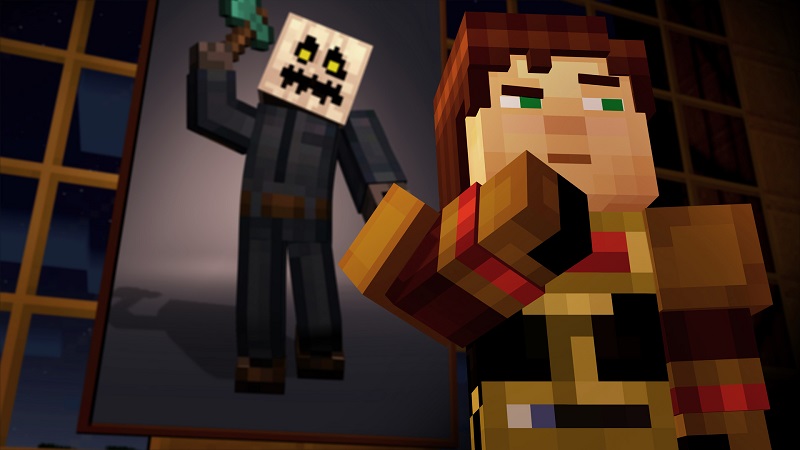
Minecraft: Story Mode – The Complete Adventure brings together the original 5 episode season and an expansion of 3 additional episodes on one disc or digital download. For players who have already purchased the original 5 episodes; the 3 episodes in the Adventure Pass are available as a standalone download, while the first episode of the original season is free to download for those who feel the need to try before you buy. The 3 episode expansion actually explores some really interesting stories and tones such as episode 6 containing a standalone story arc that is essentially a clever, well written whodunit mystery novel in Minecraft form.
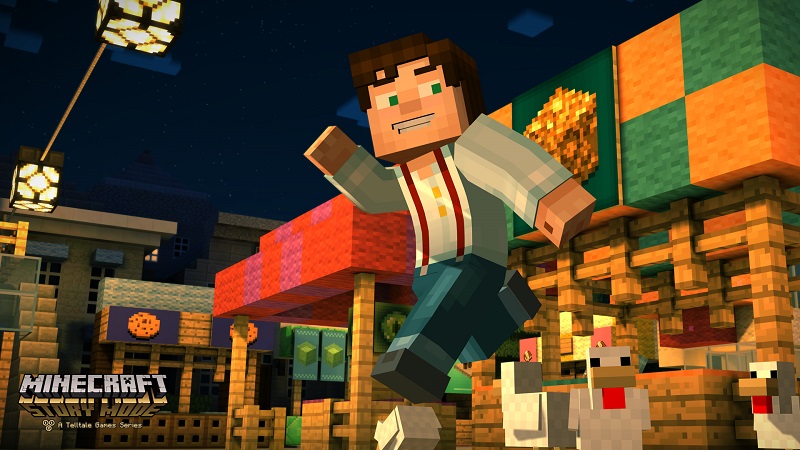
The story revolves around a male or female lead character named Jesse and his or her group of friends attempting to overcome an evil unleashed upon their world by setting out on a heroic quest to find the Order of the Stone and defeating every antagonist who opposes Jesse’s team along the way.
Building larger scale structures such as your team’s build at EnderCon is simplified into button bashing quick time events. Smaller items can be crafted by combining items together at a crafting table such as using cobblestone and a stick to craft a lever, combining three sticks and two pieces of string to craft a fishing rod, using a stick and two diamonds to craft a sword, combining three pieces of string and three sticks to craft a bow and arrow, using two sticks and three diamonds to craft an axe and more besides.
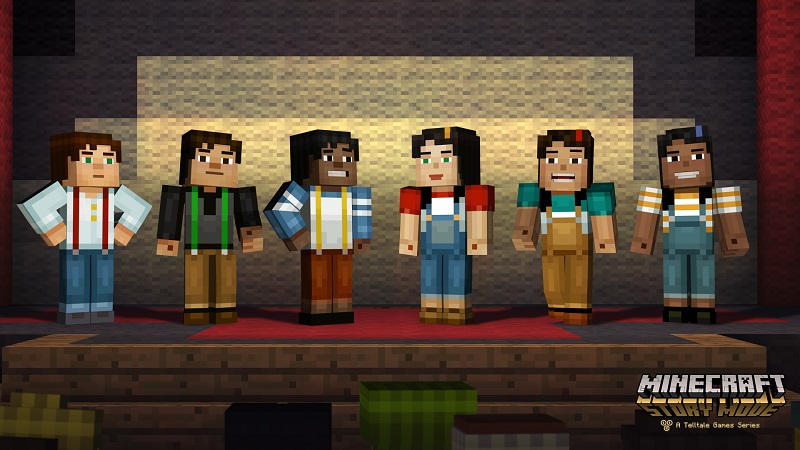
Minecraft: Story Mode is the first Telltale adventure to allow character customisation as players have the choice of a male or female version of the lead character Jesse with three available styles for each. Character and enemy design is faithful to Minecraft as every character and enemy consists of Minecraft stylised blocks. Enemy design has a positive amount of variety including zombies, creepers, spiders, skeletons shooting arrows, ghasts that shoot fireballs, endermen, accompanied by the ever lurking ominous presence of the Wither Storm and many more enemies.
The environment design is just as faithful to Minecraft as the character and enemy design with every structure and item also being constructed from the same sort of blocks. The environments capture the essence of Minecraft perfectly as they provide the scale, freedom and imagination that can be found, explored and built in Minecraft.
The comedic charm and humorous dialogue between characters from some of Telltale Games’ very best such as Tales from the Borderlands is on display from the outset with Jesse’s friend Olivia playfully asking if Jesse would rather fight a hundred chicken sized zombies or ten zombie sized chickens; shortly afterwards Jesse asks his pet pig Reuben to perform the best dragon roar. Early on in episode 2; Jesse reacts excitedly to seeing a cactus to which his friend Axel responds, “I’d take it as a souvenir but I don’t wanna stick it in my pants” receiving a deadpan expression from Jesse, “Good call, buddy”.
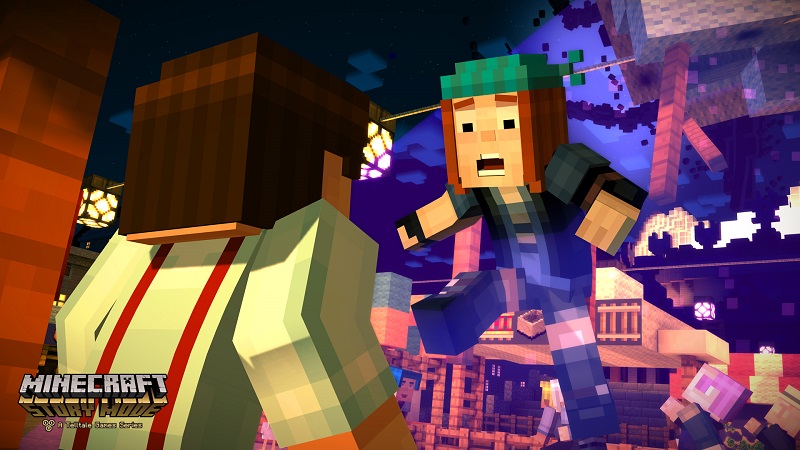
The My Choices feature from Telltale’s previous games makes a welcome return by providing an entire listing of your choices including statistical analysis regarding the percentage of players who have made the same choice as you for each moral decision as well as a variety of decisions that are scattered throughout the chapters of each episode such as if you told Reuben to run from the monsters, if you helped Petra when escaping the Wither Storm, if you reflected one of the ghast’s fireballs back at it and much more besides with the feature being directly available from the main menu and at the end of each episode.
Until a Vita version is potentially released, remote play of the PS4 version on Vita is a consolation. Minecraft: Story Mode – The Complete Adventure’s remote play performance is on par with the graphics, audio and general performance of the PS4 version. The control scheme is partially optimised as despite selectables being re-mapped to L and running moving to R; fighting actions have remained on the top left of the rear touch pad which seems a rather odd omission given that everything else from the DualShock 4’s L2 and R2 buttons were re-mapped; therefore providing a control scheme that is not as comfortable as it should have been which is something that will hopefully be addressed when the Vita native version hopefully releases.
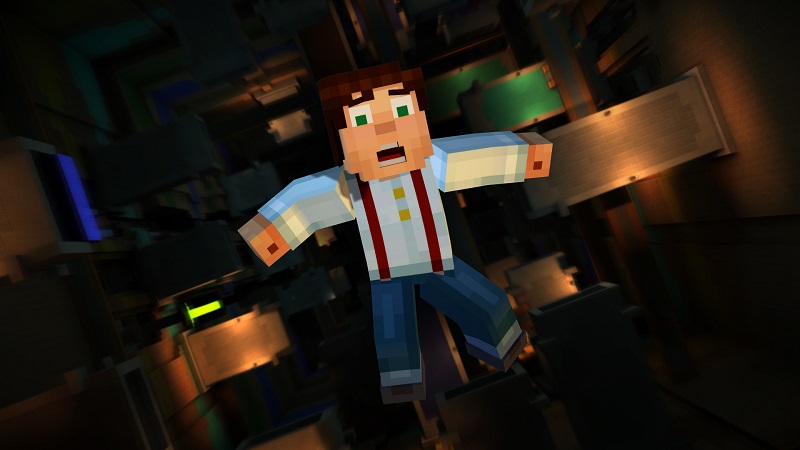
The controls are appropriately mapped to the DualShock 4 controller as the control scheme retains the refinements from Tales from the Borderlands, season two of The Walking Dead and The Wolf Among Us resulting in a greater differentiation between actions, conversations and fighting. The control scheme consists of pressing X, triangle, square or O to perform actions, starting a conversation or choosing a response during a conversation with the relevant buttons being clearly defined towards the bottom of the screen; pressing L2 to perform fight actions when defending Jesse or a friend in a one-on-one encounter with a creeper, zombie or other enemies; holding L2 to show selectables; holding R2 to run; pressing up, down, left or right on the d-pad to navigate the inventory; changing the direction of the left analogue stick to move Jesse as he explores the environments; changing the direction of the right analogue stick to move the cursor around the environment for you to investigate and observe certain objects and items of importance as well as deciding who to start or continue a conversation with or even positioning your aim when you are about to defend Jesse or a friend and avoiding enemy attacks; pressing the share button takes you to the share feature menu; and pressing the options button to display the pause menu.
There is no touch pad implementation which is surprising as the quick time events (QTEs) could have been optionally mapped to the touch pad or it could have otherwise been utilised as an optional method of exploring your surrounding environments or even participating in conversations and moral choices, while the light bar could have produced green gradually fading to red as the time available to perform a QTE during a one-on-one encounter with a creeper or zombie ticks down, alongside the lack of DualShock 4 vibration which could have been utilised when Jesse gets into one of his many fights with creepers or zombies or when having a heavy fall during exploration of a tough environment.
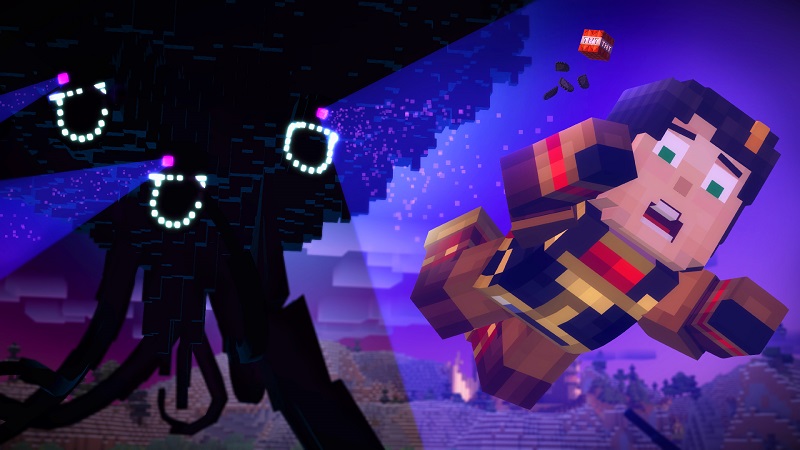
Graphically, Minecraft: Story Mode follows in the footsteps of its inspiration as everything is assembled from Minecraft blocks. Despite primarily consisting of blocks; there are some excellent graphical touches such as the light beams from the Wither Storm, lighting from flame torches in otherwise darkly lit locations including caves and even expressing emotions on character’s faces.
The presentation of the game is solid with a great user interface across various menus such as the main menu, episodes menu, my choices menu, settings menus and gameplay menus with support for navigation via the left analogue stick, directional pad and face buttons, although it does not include support for navigation via the right analogue stick and touch pad. The background of the menus focuses on the venue of EnderCon and the excitement surrounding the convention.
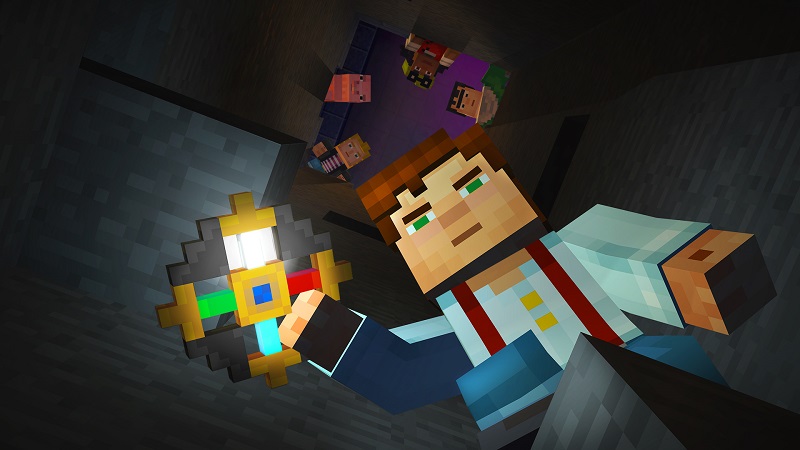
An excellent array of voice-over performances from the entire cast including Patton Oswalt voicing the male Jesse having starred as the Koenig quadruplets in Marvel’s Agents of S.H.I.E.L.D. and voicing lead character Remy in Ratatouille, while Catherine Taber voices the female Jesse having previously voiced Shanna the She-Devil and Rogue in Marvel Heroes and Andoria in Final Fantasy: Type-0 HD; Dave Fennoy voices Gabriel the Warrior having voiced Lee Everett in The Walking Dead: Season 1 and Bluebeard in The Wolf Among Us; Ashley Johnson voices Petra having voiced Gortys in Tales from the Borderlands and Ellie in The Last of Us; Martha Plimpton voicing Olivia having starred as Stef in The Goonies; Brian Posehn voices Axel having voiced Hunter in Brutal Legend; Paul Reubens voicing Ivor having previously starred as Elijah Van Dahl in Gotham and Batman Returns as Penguin’s father, voicing Willard Wyler in Call of Duty: Infinite Warfare’s Zombies in Spaceland and starring as Pee-Wee Herman; Scott Porter voicing Lukas having previously voiced Luke in The Walking Dead: Season 2 and Dick Grayson and Nightwing in Batman: Arkham Knight; and even more cast members producing equally talented performances. Sound effects include walking, interaction with objects, crafting items and ambience such as wind and pressure pad traps, while the music reflects the tone of the scene from thoughtful and provoking to foreboding and climactic. The lack of any DualShock 4 speaker implementation is surprising as it could have produced a further layer of audio with voice-overs for conversations, sound effects such as collecting an item for your inventory, crafting an item and ambience or music.
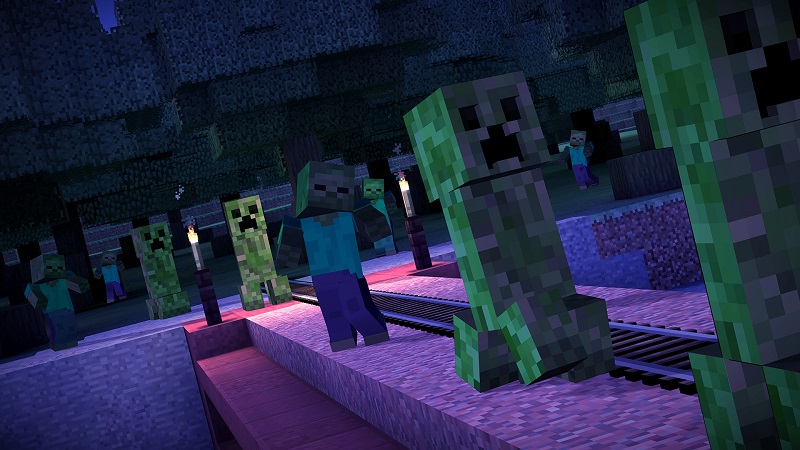
The trophy list includes 51 trophies with 23 bronze trophies, 19 silver trophies, 8 gold trophies and 1 platinum trophy. The trophy list for all 8 episodes of Minecraft: Story Mode – The Complete Adventure is almost entirely based upon completing each chapter within every episode with exception to a gold trophy for attempting to craft a lever at the crafting table in chapter 2 of episode 1, 2 bronze trophies for acquiring the Griefer in chapter 2 of episode 2 for choosing the green ending at the end of episode 1 and acquiring the Engineer in chapter 2 of episode 2 for choosing the red ending at the end of episode 1 and a further gold trophy for exhausting your conversation with Jesse’s pet pig Reuben in chapter 4 of episode 3 by talking to Reuben about everything followed by smiling at him 10 to 15 times which should make Jesse ask Reuben to tell him a joke. A chapter select feature results in a somewhat easy trophy list in regards to the fact that you will platinum the trophy list if you are able to complete the story with just a little more than a single playthrough required. It is estimated that depending upon skill and a good trophy guide to provide some helpful tips that it would take between 15 to 20 hours to platinum the trophy list.
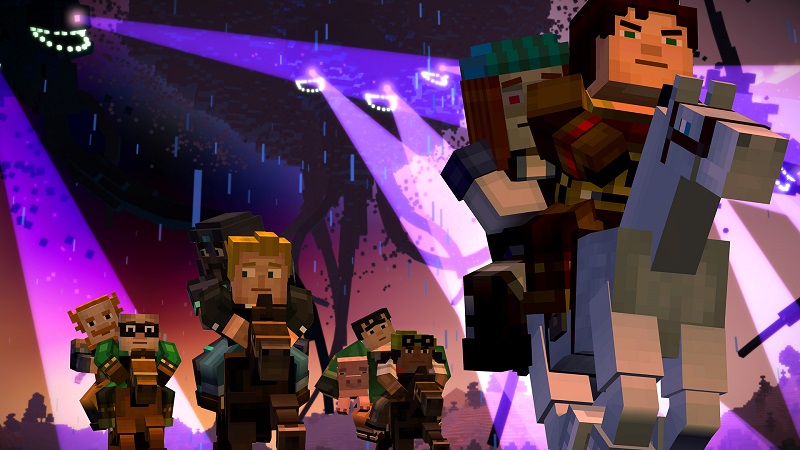
There are certain areas that provide an increased difficulty curve such as early on in episode 4 when Jesse is riding a horse while simultaneously having to attack enemies that are directly ahead, jumping over ditches and avoiding powerful enemy attacks. There are numerous puzzles that have to be solved throughout Minecraft: Story Mode – The Complete Adventure including pressure pad traps in episode 1 which tasks the player in creating a bow and arrow or fishing line to apply pressure on the pad to prevent the shooting arrows from continuing any further. Lever puzzles play a major part in the majority of episodes such as five levers that must be pushed or pulled in the correct order to activate the mechanisms to shine the lights upon a map in order to be guided to the next location. A large scale complex maze can be rather hard to navigate in episode 4, while items are required to be positioned in a specific sequence in order to unlock doors and passageways.
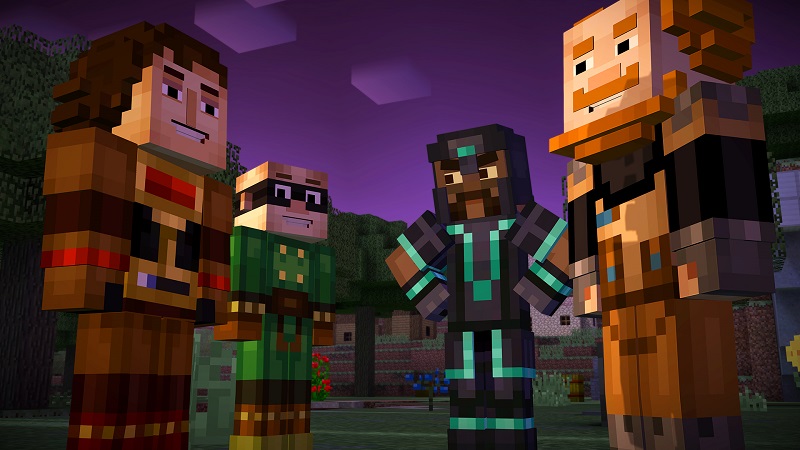
There are no local or online multiplayer features and no online leaderboards, although local and online co-operative multiplayer may have possibly worked for two players to team up as Jesse and one of his friends to explore the game together. However, the lack of local and online multiplayer features do not detract from the experience as you would not anticipate such a component to necessarily feature in a story driven point and click focused game in a genre that is usually solely single player, although online leaderboards could have worked well by providing a competitive challenge in regards to how quickly each player had completed each chapter, each episode and the entire story. However, despite there being no online leaderboards; there is a statistical analysis of the decisions that you have made during each episode in comparison to the decisions that everyone else who has played Minecraft: Story Mode has made which is a positive design choice in the sense that it provides you with an in depth look at if you have made the correct decision or if you were incorrect in the eyes of a certain percentage of people who have played the game. Every decision within each episode is clearly defined in the statistical analysis and it is incredibly interesting to see at the end of the final chapter of every episode what percentage of players made the same decisions as you and to also see the percentage of players that disagreed with your choices.
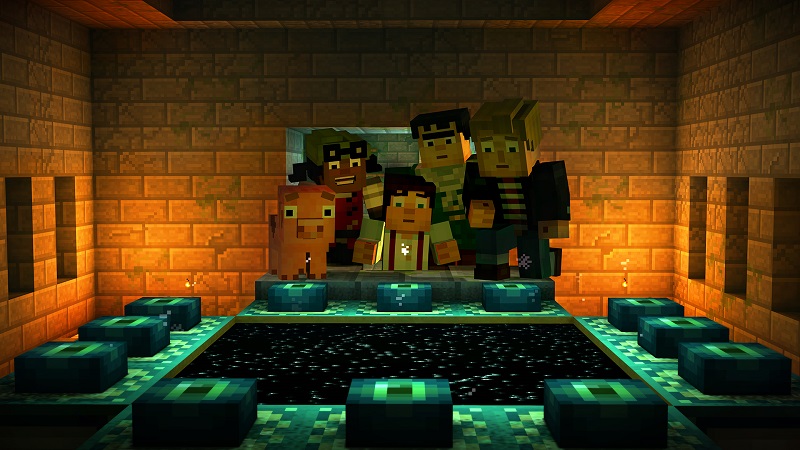
The replayability of Minecraft: Story Mode – The Complete Adventure stems from the multiple storylines players can shape by playing the game over the course of multiple playthroughs. Experimenting with different combinations of moral choices to see which direction your decisions will ultimately guide the story regarding which group Jesse teams up with in certain scenarios within particular episodes; therefore creating a closer bond between Jesse and specific characters he was not as acquainted with beforehand and making prior friendships even stronger.
Analysis
- Title: Minecraft: Story Mode – The Complete Adventure
- Developer: Telltale Games
- Publisher: Telltale Games
- System: PS4 (Version Reviewed) and PS3
- Format: Blu-Ray Disc/PSN Download
- Cross-Buy: No
- Cross-Play: No
- Players: 1
- Hard Drive Space Required: 9GB (Version 1.11)











